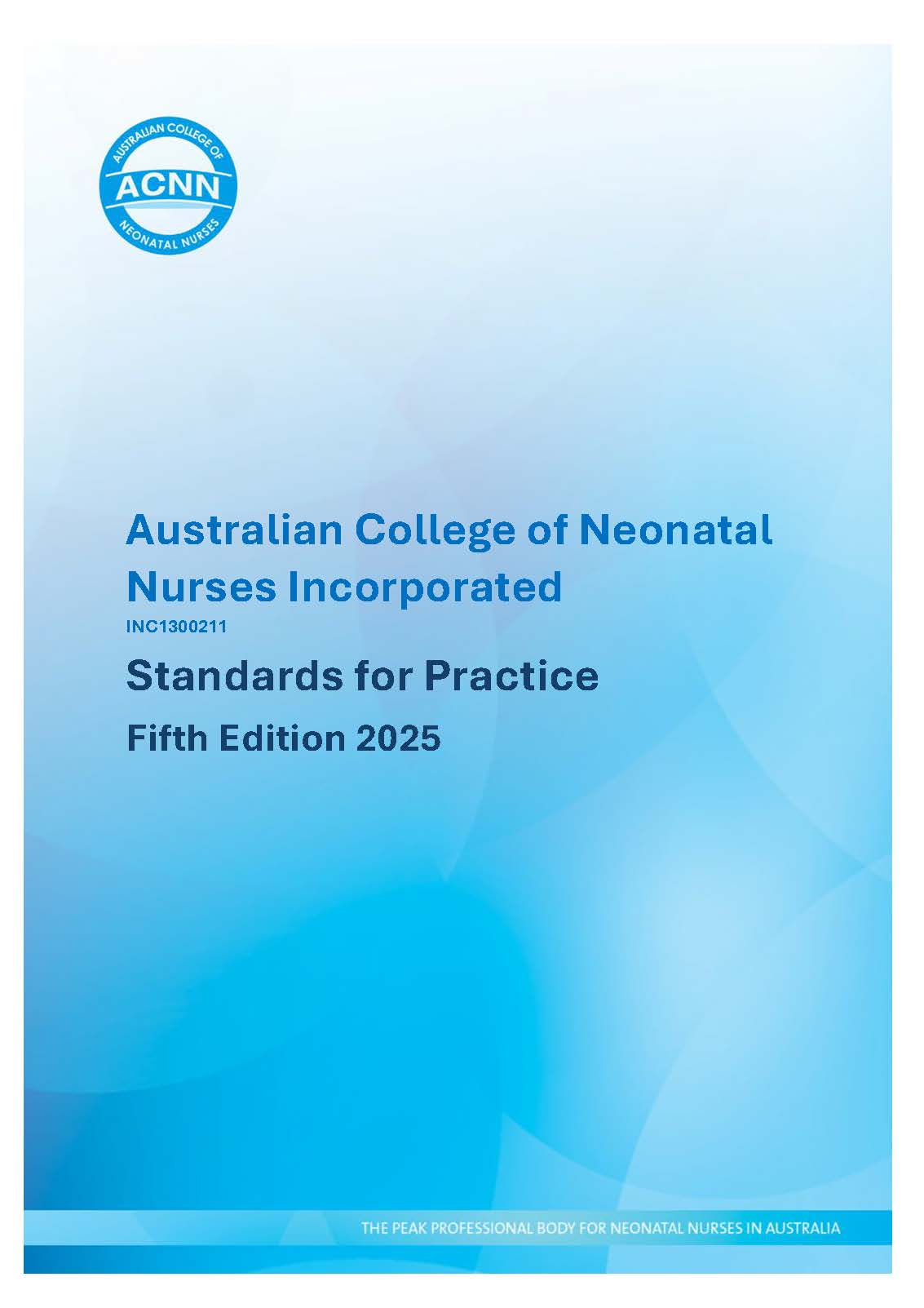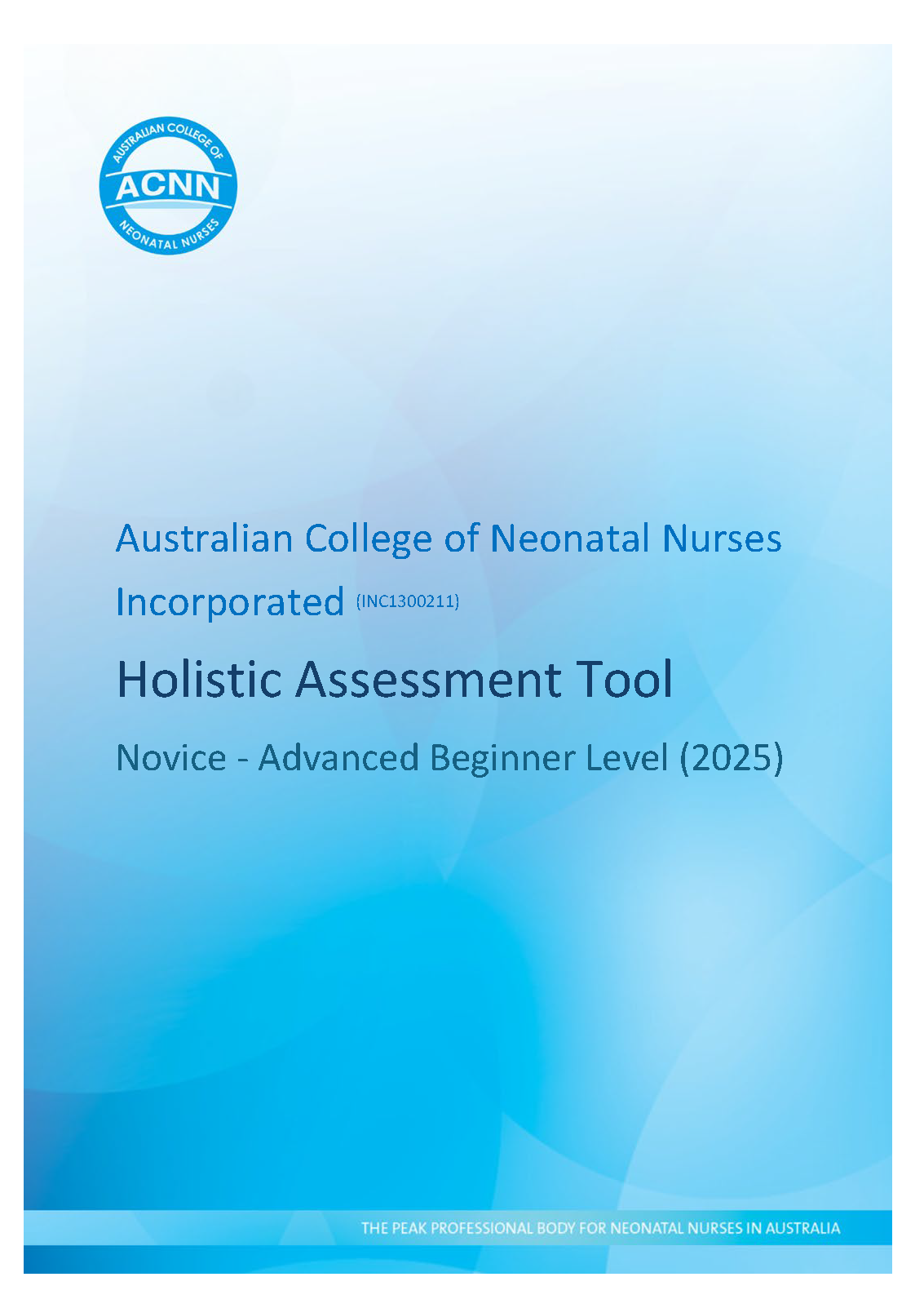
ACNN first developed Standards for Practice for Neonatal Nurses ('the Standards') for this specialty area in 2004 and these have been
updated every 5 years since. In 2025, accompanying toolkit were developed to be used in conjunction with the Standards.
ACNN acknowledges the Australian Standards for Practice for registered nurses, registered midwives, nurse practitioners and enrolled
nurses. The registered nurse (RN) standards have been used as the foundation for these Standards of Practice for Neonatal Nurses and
then further developed for applicability for those who work in a clinical or non-clinical capacity to contribute to the care of neonates
and their families within inpatient and post-discharge contexts. The Standards inform professional practice, professional development and
capability for all neonatal nurses in the provision of safe, high quality clinical care and are inclusive, but not limited to, direct
clinical care, education, leadership, management and research.
ACNN encourages neonatal nurses across all fields to utilise the Standards as part of delivering clinical care, undertaking research, as part of postgraduate courses and professional development review and plans.
The 2025 edition of the Standards for Practice and accompanying toolkit are now available from eso@acnn.org.au.

The TOOLKIT includes Holistic Assessment Tools
for each level, a Behavioural Cue Tool and a Clinical Ladder Tool.
Features and Tips
- These assessment tools are fillable PDFs forms
- Allow several hours to observe the nurse in the usual context of their workday
- Use the Behavioural Cues document to help the assessor identify the actions and behaviours of the nurse that meet each standard of practice
- Can be conducted in Special Care and Intensive Care neonatal settings
- Important to allow enough time to give feedback at the end of the assessment and set goals
- Can be saved to an individual's portfolio after signing
Holistic Assessment Tool for neonatal nurses at each of the 4 levels: Novice-Advanced Beginner Level, Competent, Proficient and Advanced-Expert.
A holistic approach to assessing nurse knowledge and performance involves observing the neonatal nurse's overall role performance. This
includes observing and assessing their communication, ethics, technical skills, cultural awareness, attitudes, knowledge, professional
behaviors, clinical decision-making, and critical thinking. As an assessment of practice, assessors must, therefore, carry out the
observation in the context of the neonatal nurse’s interactions with infants and families. This method is useful in determining the nurse’s
skills, knowledge, values and attributes within their practice.
An holistic assessment of practice is a valid model of measuring core skills and competencies, but should be conducted via a collaborative
relationship between neonatal nurse and the assessor. This ensures mutual understanding of the process, and helps the neonatal nurse feel
confident in the process and its purpose. During the assessment, the assessor uses their knowledge and professional judgement, drawing
inferences and tacit awareness to form conclusions about the neonatal nurse’s practice. Therefore, use of this tool requires sufficient
duration of observation in the nurse’s usual clinical context to achieve a reliable assessment.
At the conclusion of the observation period, an essential component of the assessment is the reflection process. Assessor and neonatal
nurse discuss the observation, performance, strengths and developing skills/knowledge to provide guidance on further development.
Behavioural Cues Tool
This tool provides suggested actions, gestures, expressions, behaviours and statements that reveal insight into an individual’s skills and
knowledge. When referred to as part of a holistic assessment, they assist in identifying a neonatal nurse’s skill and ability in the
clinical context and highlight their ability to adapt to different situations. Each level of the behavioural cues tool builds on prior
completed levels and provides a framework for assessing behaviours and actions in conjunction with the holistic assessments. The educator or
assessor may use the tool as a way to mentally ‘mark-off’ expected behaviours and actions throughout the assessment period. It is designed
as a support tool to be used in conjunction with the holistic assessment.
Clinical Ladder Tool
Clinical ladder tools offer an opportunity to promote best-practice, enhance professional development, recognise clinical expertise and
increase nurse satisfaction. Many clinical ladders are based on Benner’s ‘novice to expert’ model, focusing on development of nurses through
stages of practice, skill and capability. Using this kind of model allows nurses to sharpen their skills and patient care expertise across a
continuum. This tool provides a framework, based on the Standards for Practice for Neonatal Nurses (2025), that enables nurses and managers
to recognise broad levels of achievement and set professional goals and objectives for the coming year. Ideally, the clinical ladder is used
in conjunction with a local Professional Development Review (PDR) process. The manager and neonatal nurse discuss the nurse’s progress on
the ladder, reviewing achievements and successes. In consideration of reaching the next level of the ladder, the manager and neonatal nurse
identify activities and practices that assist in progression and advancement.
Please email eso@acnn.org.au for a copy of the standards and toolkit.
